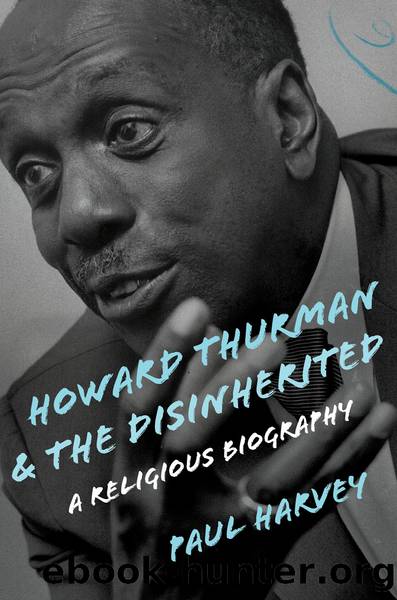Howard Thurman and the Disinherited by Paul Harvey

Author:Paul Harvey
Language: eng
Format: epub
Publisher: Wm. B. Eerdmans Publishing Co.
Published: 2020-03-15T00:00:00+00:00
4
âA Sense of Coming Homeâ
The Great Adventure in San Francisco
There was kindling in my mind the possibility that this may be the opportunity toward which my life had been moving.
âHoward Thurman, Footprints of a Dream
Howard Thurman moved to San Francisco in July of 1944 to pursue his dream of an interracial fellowship. He had visited San Francisco for the first time in the late 1920s and had taken immediately to the city. In his published memoirs, he recalled attending staff meetings of the national YMCA held in California in the early 1930s. One summer, as he recollected, âwhen I disembarked from the Oakland ferry and walked down Market Street, I had a sense of coming home that I never felt any place else in the world.â The city by the bay was, from that point forward, his real home, even during his years in Boston from 1953 to 1965. Little wonder that he moved back west after his retirement from Boston University and lived out his days on Stockton Street, near the north bay and Coit Tower, where he served as a mentor to a small but influential group of disciples who would go on to careers in the church, in academia, and in social activism.
Thurman moved to San Francisco to pursue what he considered one of the great adventures of his life: to establish an interracial congregation in America âthat was capable of cutting across all racial barriers, with a carryover into the common life, a fellowship that would alter the behavior patterns of those involved.â He wrote to a correspondent, âIf Christianity cannot do this, then we shall have to find some other faith, and there is no other faith on the horizon.â It could be, he thought, the fulfillment of the vision he had at Khyber Pass. When spirits spoke to him in natural settings, Thurman listened, and remembered.
His work with the Fellowship Church seemed to embody his thoughts in âThe Meaning of Commitment,â when he wrote: âCommitment means that it is possible for a man to yield the nerve center of his consent to a purpose or cause, a movement or an ideal, which may be more important to him than whether he lives or dies. The commitment is a self-conscious act of will by which he affirms his identification with that he is committed to. The character of this commitment is determined by that to which the center or core of his consent is given.â Then in the prime of his powers, Thurman wanted to âfind out for myself whether or not it is true that experiences of spiritual unity and fellowship are more compelling than the fears and dogmas and prejudices that separate men.â
Leaving Howard University behind, he came to San Francisco during an era of rapid transition. It was a city of 630,000 just before World War II; of those, only about 5,000 were African American. By the end of the war, thanks to westward immigration, approximately 32,000 African Americans lived in the city (and many more lived across the bay, in Oakland, Berkeley, and Richmond).
Download
This site does not store any files on its server. We only index and link to content provided by other sites. Please contact the content providers to delete copyright contents if any and email us, we'll remove relevant links or contents immediately.
Winning the War in Your Mind by Craig Groeschel(545)
A World Ablaze by Craig Harline(512)
White Too Long by Robert P. Jones(475)
Beautiful Resistance: The Joy of Conviction in a Culture of Compromise by Jon Tyson(470)
The Mission by David W. Brown(465)
History of the Church by Eusebius(462)
In the Reign of King John by Dan Jones(460)
No More Christian Nice Guy by Paul Coughlin(434)
The Crusades: A History by Jonathan Riley-Smith(407)
Why Study History? by John Fea(390)
The Black Church by Henry Louis Gates Jr(376)
The Tale of the Tardy Oxcart (Swindoll Leadership Library) by Swindoll Charles R(375)
Three Messiahs : The Historical Judas the Galilean, the Revelatory Christ Jesus, and the Mythical Jesus of Nazareth (9781450259477) by Unterbrink Daniel T(373)
The History of Palestine by John Kitto(357)
A Spacious Life by Ashley Hales(352)
Assassination of a Saint by Eisenbrandt Matt(341)
Augustine of Canterbury by Robin Mackintosh;(326)
The Zionist Bible (BibleWorld) by Masalha Nur(323)
Border Lines: The Partition of Judaeo-Christianity (Divinations: Rereading Late Ancient Religion) by Daniel Boyarin(322)
